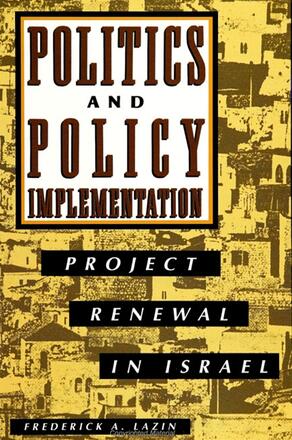
Politics and Policy Implementation
Project Renewal in Israel
Alternative formats available from:
Description
This book analyzes how the political system influences domestic policy implementation in Israel. It shows how coalition politics, party dominated ministries, an independent and fragmented Jewish Agency, diaspora Jewish communities, powerful mayors, and ethnic considerations influenced the implementation of Begin's Project Renewal, a hybrid of the American War on Poverty, Urban Renewal, and Model Cities. It also reveals how Project Renewal initiated change in Israel's political institutions and public policy system.
Frederick A. Lazin is The Lynn and Lloyd Hurst Family of Local Government Professor and Associate Professor in the Department of Behavioral Sciences, and Director of the Overseas Student Program at Ben Gurion University of the Negev. He is the co-editor of Cities, Communities, and Planning in the 1980s and Policy Impact of Universities in Developing Regions; and he is the author of Policy Implementation of Social Welfare in the 1980s.
Reviews
"As a case study of Project Renewal, this book will become the benchmark analysis. Lazin's examination of Project Renewal describes the role of institutions and personalities paying particular attention to the organizational context in Israel and the capacity of politicians to use institutions as instruments of political rivalry. He has sorted out the multiple layers of institutional involvement within Israel and also in the Jewish communities outside of Israel which provided crucial economic resources. That sorting out is, itself, an extraordinary accomplishment, but Lazin's book goes much further. He explains the dynamics between local and national governmental structures and describes the relationship of these structures to political party dynamics, a crucial and little understood issue even among specialists. Lazin is as sensitive to issues of style and personality as he is to organization. This is an important study for those interested in both the theory and practice of politics." — Donna Robinson Divine, Smith College